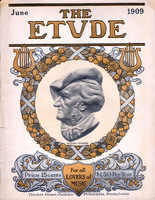Selected Content from the June 1909 Edition of The Etude
VLADIMIR DE PACHMANN. (Pahk-man.) De Pachmann was born at Odessa, Russia, July 27, 1848. His father was a Professor at the University and had considerable reputation as an amateur violinist. He had, when in Vienna, been on friendly terms with Beethoven... Read More
Read More
A medical authority has been inquiring into the early deaths of the creative musical masters. He ascribes it to mental overstrain, to the immense difficulty of conceiving and carrying out of ideas, and to the irritating necessity of bargaining with publishers, which is peculiarly distressing to musical geniuses. Schubert, Mozart and Mendelssohn are cited as having died young, on these accounts, but the deaths of the first two at least, was probably due to neglect and semi-starvation. Read More
Music That Progressive Teachers Have Found Desirable Pupils of D. H. Greenberg.Prelude (C Sharp Minor), Rachmaninoff; Fantasie-Impromptu, Chopin; Rigoletto Fantasia, Verdi-Liszt; Rhapsodie No. 13, Liszt; Valse Caprice, Joseph Hoffman; Rhapsodie No. 2, Liszt; Overture, William Tell (4 hds), Rossini; Rondo… Read More
Czerny’s compositions, some of which embrace fifty numbers, approach the formidable number of a thousand, not counting the piano arrangements of numerous symphonies, oratorios, operas, overtures, etc., nor a German translation of Reicha’s voluminous work on harmony, nor his own grand method for the piano so well described in Adolph Kullak’s (1823-1862) “Æsthetics of Piano Playing;” nor his own “Treatise on Composition;” nor, if I am not mistaken, twenty-four masses with orchestra, four requiems, three hundred graduales, motets, concertos, symphonies, quartets and quintets, songs with and without orchestra, all of which are still in manuscript. Read More




